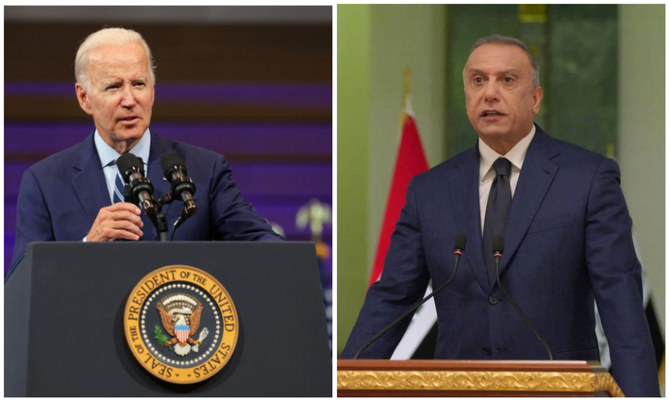WASHINGTON: US President Joe Biden held a call on Wednesday with Iraq’s caretaker prime minister, Mustafa Al-Kadhimi, after violence this week in Baghdad, the White House said.
“The President commended Prime Minister Kadhimi’s personal leadership during escalating tensions and violence over a 24-hour period earlier this week,” the White House said in a statement after their call, adding the two leaders agreed to stay in touch in the coming weeks.
Baghdad saw its worst fighting for years this week as rival Shiite Muslim groups battled in the capital after powerful cleric Moqtada Al-Sadr announced he was leaving politics.
Sadr said his decision was prompted by the failure of other Shiite leaders and parties to reform Iraq’s governing system. The United States had described the unrest as disturbing.
The violence cooled after Sadr ordered his followers on Tuesday to end their protests in central Baghdad. Apologising to Iraqis after 22 people were killed in clashes between an armed group loyal to him and rival Shiite Muslim factions backed by Iran, Sadr condemned the fighting and gave his own followers orders to disperse.
Biden and the Iraq prime minister “welcomed the return of security to the streets” and called on local leaders to engage in dialogue in line with Iraq’s constitution, the White House said.
The recent clashes followed 10 months of political deadlock since parliamentary elections, and President Barham Salih has warned that the crisis is not over, calling for early elections.
The White House said that Biden “praised the performance of the Iraqi Security Forces and extended condolences to the families of those killed in the recent fighting.” The White House readout did not mention Sadr by name.
Biden holds talk with Iraq PM after recent violence
https://arab.news/6eh62
Biden holds talk with Iraq PM after recent violence

- The president commended Al-Kadhimi’s personal leadership during escalating tensions and violence
- Two leaders agreed to stay in touch in the coming weeks
Syrian authorities arrest leader of terrorist cells in Lattakia

- Ali Aziz Sbeira is accused of violating civilians’ rights during the Syrian uprising after 2011
LONDON: Syrian authorities have arrested Ali Aziz Sbeira, a prominent leader of terrorist cells responsible for attacks on internal security checkpoints, the Syrian army and civilians during the country’s uprising against the former regime of Bashar Assad.
The Internal Security Directorate announced on Wednesday the capture of Sbeira in Lattakia province, located on the Mediterranean Sea.
Authorities accuse him of leading and supplying arms to terrorist groups. Hailing from the town of Jableh, Sbeira is also accused of having links to Ghiyath Dalla and Brigadier General Nours Makhlouf, two military figures associated with the former rule of Assad.
Sbeira is accused of violating civilians’ rights during the Syrian uprising after 2011, when he joined the National Defense Militia and helped suppress peaceful demonstrations, according to the Syrian Arab News Agency.
In 2014, he joined the 4th Armoured Division, which was commanded by Maher Assad, brother of the former president, from 2018 until the collapse of the Assad regime in December 2024.













